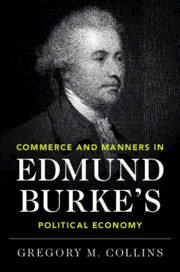Book contents
- Commerce and Manners in Edmund Burke’s Political Economy
- Commerce and Manners in Edmund Burke’s Political Economy
- Copyright page
- Dedication
- Contents
- Figures
- Tables
- Acknowledgments
- Introduction
- Part I Biography
- Part II Market Economies
- Part III The British Constitution and Economical Reform
- Part IV Foreign Trade
- Part V India
- Part VI The French Revolution
- Conclusion
- Bibliography
- Index
Conclusion
Published online by Cambridge University Press: 24 April 2020
- Commerce and Manners in Edmund Burke’s Political Economy
- Commerce and Manners in Edmund Burke’s Political Economy
- Copyright page
- Dedication
- Contents
- Figures
- Tables
- Acknowledgments
- Introduction
- Part I Biography
- Part II Market Economies
- Part III The British Constitution and Economical Reform
- Part IV Foreign Trade
- Part V India
- Part VI The French Revolution
- Conclusion
- Bibliography
- Index
Summary
I conclude that Burke was one of the most prominent advocates of economic liberty in eighteenth-century England. I then summarize Burke’s principles of political economy, placing heavy emphasis on his defense of a free internal trade, his prudential advocacy of free trade in the foreign arena, and his endorsement of private property rights. I contend that Burke’s economic thought retains a meaningful consistency with his political thought – and thus, that Burke did not perceive an inherent tension between liberty and tradition. Therefore, there was no “Burke-Smith” problem or “Das Edmund Burke Problem” to begin with. In Burke’s judgment, a careful integration of market dynamism and the moderating presences of traditional virtue and landed property was essential for commercial prosperity. The most important lesson Burke’s economic thought teaches, however, is that civil society cannot endure on transactional exchange and voluntary contracts alone. Market economies are important instruments for the commercial enrichment of a people, but the deeper chords of friendship and trust, religion and virtue, are the ultimate bedrocks of social order and progress. I end by suggesting that our temptation for gain in the modern commercial economy should not make us forget our deeper obligations to our fellow man.
Keywords
- Type
- Chapter
- Information
- Commerce and Manners in Edmund Burke's Political Economy , pp. 526 - 536Publisher: Cambridge University PressPrint publication year: 2020

